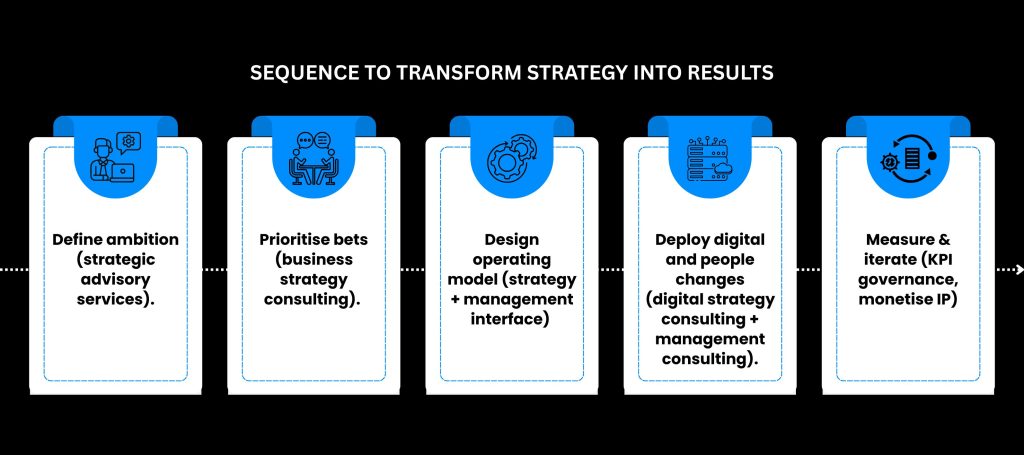Strategy-based decisions and disciplined execution have become business requirements, and the global consulting market is expanding, making external expertise the new standard for companies looking to grow, adapt, or protect their market presence. As businesses invest in transformation and delivery capabilities, the global strategy consulting segment has to grow to approximately USD 71–75 billion in 2024, while the broader market management consulting segment is estimated to grow to USD 300 billion or more, depending on the scope.
The two drivers of this growth that every board is concerned about today are the accelerating digital transformation and the productive use of AI. Leading companies are implementing bespoke AI agent and platform toolsets to reduce the time of an analysis cycle and accelerate the speed of implementation, a structural change that will transform the business strategy consulting and digital strategy consulting offerings.
One-Sentence Distinction
Strategy consulting determines an enterprise’s achievement in its market positioning, portfolio decisions, M&A reasons and long-term business architecture, while management consulting determines how to actualise the decisions in its processes, people, systems and governance. These are sequential and symbiotic; a strategy made without delivery is speculation, and implementation without a defined strategic direction is optimization without a purpose.
A Basic Comparison
Aspect | Strategy Consulting (Global strategy consulting / Strategic advisory services) | Management Consulting (Strategy management consulting) |
Core question | Where are we going to play, and how are we going to win? | How shall we now make the course of choice to work? |
Typical horizon | 3–5 years (long-term) | 0–24 months (short to medium term) |
Primary clients | CEO, Board, Corporate Strategy | COOs, Heads of Ops, HR, Finance, IT |
Output | Expansion plan, investments, pricing policy | Process redesign, ERP roll-out, change programmes |
Signature tools | Financial scenario modelling, market models | Lean six sigma, ERP, PMO, KPI dashboards. |
These rows of this table extend themselves in a logical flow: the strategy provides the direction, and management consulting provides the interpretation of that direction into the workplans, which can be measured.
Why Integrated Advisory Works Better In The Future
It is cost-effective to combine execution and insight. Organisations that purchase strategic advisory services without implementing intensified management consulting have lengthy time-to-value and value leakage. The flipside is that companies with internal optimisation only might fail to capture structurally better market opportunities. Those advisory firms and clients who provide and embrace an end-to-end value portfolio from diagnostic and digital consulting to operational delivery, will be rewarded in the near-term future. This consolidation of capability is attested by recent actions in the industry (strategy firms developing implementation units; consultancies enriching strategic practice).
Flowchart
This sequential development explains why related activities, but not stand-alone services, can be described using keywords like “digital strategy consulting” and “strategy management consulting.”

Recent Developments And Implications
Economic Benefits
- Accelerated Time-to-Value
When management consulting and business strategy consulting work together, organisations can make an immediate impact on the market. Proper alignment of strategies minimises delays in projects and assists companies in getting a possibility to earn incomes sooner.
2, Optimised Cost Efficiency
Integrated consulting removes overlapping efforts since the data collection to the implementation procedure is conducted. This alignment will allow businesses to redistribute budgets to high-paying areas so as to have leaner operations without having to implement a reduction in strategy depth.
- Reduced Execution Risk
On-ground management consultants also help strategic advisory services to achieve accountability on each and every level of transformation. This two-fold model minimises the failure rates in electronic initiatives and complicated reorganisations which protect long-term ROI.
- Digital Transformation on a Scale.
As the digital strategy consultancy is part of the process, businesses acquire scalable and adaptable structures for emerging technologies. This will enable companies to respond fast to market dynamics, AI implementation, and changes in regulations, making change sustainable.
- Intellectual Property and Innovation Monetisation.
Integrated consulting engagements tend to create reusable assets, data models, frameworks and automation blueprints. These are intellectual property (IP), which organisations can commercialise, and internal capabilities turn into long-term sources of revenue.
Conclusion
In the future, the line separating strategy and management consulting will be even more unclear, though this point is the same. Boards must acquire assurance of implementation and comprehension of direction. Better financial outcomes will be achieved by businesses that integrate deep global strategy consulting with robust management consulting services and incorporate digital strategy consulting into each project. Choose Inductus Group to turn the insight into an actualised impact, which will create a long-lasting competitive advantage.









